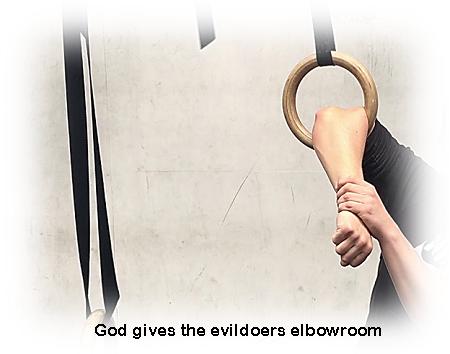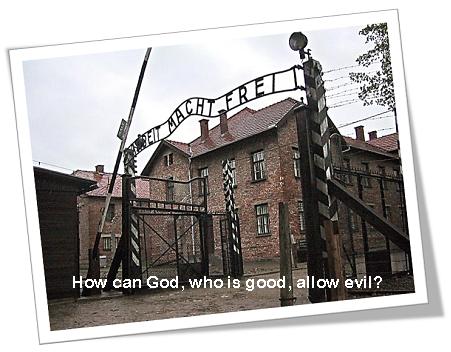God and Our Original Sin
God and Our Original Sin

Our sin proceeds along the paths of the created structures of our being, and are accessible to us. God has allowed us to discover them ourselves – with the purpose that we should confess our sins to Him. Together with our non-believing fellow human beings we can examine them and artistically portray them. Could it be that God only reproaches us in retrospect? Could He do nothing to stop sin running rampant throughout the future history of humanity?
It is important to delve separately into God’s position concerning original sin. The inherited guilt concept and federalism draw special attention to this aspect. Emphasis is often placed on the fact that serious manifestation of sin through a corrupted nature, transmitted through the generations, is God’s punishment for the original sin. Isn’t original (inherited) sin therefore an autonomic process in humanity? Did Adam automatically become a sinful being when he ate the forbidden fruit? And have parents ever since automatically passed on their sinful nature to their children?
It is said that, as an act of rebellion against God, the sin itself was so serious that it brought with it the consequences of a corrupted nature that spreads through reproduction. But does God then have no influence upon this process?
Starting from God’s sovereignty, His rule over all, we will have to recognize that this whole process does not take place beyond His influence. God was not ‘surprised’ by the first sin. He was not forced to look on impotently at human nature becoming corrupted to the core. He was not forced by the course of events to leave sin to its own dynamic and let it spread destructively beyond all bounds, right up to the time before the Great Flood and the century of the two world wars. He did not just suffer and mourn over this until the time came to take countermeasures of uncertain effectiveness.
The Deciding God⤒🔗
On the other hand, once Adam had sinned, God did not need to take a separate decision to sentence humanity to suffer the ensuing consequences. Such a decision or sentence is not recorded in the Bible’s historic narrative. God does repeatedly pass judgments in which He pronounces punishments for sin – after He has first warned: you will die – but that is clearly something different. We already heard that the Reformed confession attributes inheritance of sin to a ‘just judgment’ of God, followed by a ‘hidden and just judgment’. The latter sounds like a solution arising out of embarrassment. How can we speak meaningfully about a hidden judgment of God? Has he revealed a hidden judgment to us? We will have to start with the unity of God’s decisions. The Creator, who is also Redeemer, is also the Judge. When He created us with all the structures and all the relations in which we exist, it was already determined by Him that the corruption of the best would be the worst. He created the structures in such a way that the original sin would lead to inherited sin. Nothing proceeds ‘automatically’ in the world. There is causality, there are connections between cause and effect, but they are never outside of God, his decision(s) and rule.
Elbowroom←⤒🔗
The closest the Bible comes to the alleged hidden and just judgment of God is in Romans 1, where we read about those who have been ‘given over’ to sin. Corruption is already present but God gives them over to ongoing sins. His wrath is working through the dynamics of sin. However free people feel in their sinning, free of God and laws and bonds, and however they might enjoy it, God’s hand is in it, the act of His wrath. We also read repeatedly in Revelation about that same ‘giving over’: he who was ‘given’ to do this or that. Prophecies like Daniel’s vision in Chapter 7 lie behind this. We also find it in the Old Testament prophecies about the foreign superpowers Assyria and Babylon, who receive elbowroom to develop their power, even against God’s people. It is also present in Job 1 regarding Satan. God gives the evildoers elbowroom. He is active in that sense. And at the same time, the elbowroom is always limited. However widely sin spreads in humanity, even into the highest echelons of worldly power, no man and no devil ever has free play.

In this manner we can speak of original sin in a way that does justice to both the internal dynamic of sin and the government and judgment of God.
Wrongdoer←⤒🔗
We now come to following and final question. Why did God permit this? Why did He allow sin to enter and to spread and grow strong in the world? Isn’t this the question raised by the people of our day? Why did God allow Auschwitz? But the question thrusts deeper. It is not limited to the outbreak of evil that we find the most repulsive merely because it lies the closest to us in memory and experience. Why did God allow the Gulag archipelago? And numerous ethnic purges in our times as well as that of the Indians in America? The Cultural Revolution in China, and the Thirty Days’ War and (in reverse chronology) the scourges of the Turks, Mongolians and Huns? And cruelties by the Babylonians and Assyrians? And endless other acts of violence with perhaps fewer victims, or in other parts of the world, or in the more obscure areas of history, or what is unknown? The enormity of human evil (whereby we are prone to identify more with the victims, but our present concern is with the wrongdoers: that is, ourselves) does not allow itself to be weighed or expressed in figures, let alone comparatively measured. We can, for example, add the slaughters in abortion clinics, even though – outside certain circles – that is not done. Why, throughout history, did God allow matters to develop to this extent?
The standard answer is that sin is against His will but does not take place outside of His will. That is a respectful answer which respects the boundaries of our knowledge. It does remain mysterious, though. However, we saw earlier that we cannot leave original sin a mystery. Therefore I would like differently to demarcate the boundary that we must respect when reflecting on this question: We are the ones who did it! “You are the man!” We are in the dock as the accused, the sinner, and the one guilty of original sin. We must take that responsibility upon ourselves. We cannot leave the dock and walk around the accuser in order to stand behind God and look over His shoulder at His judgment. There is no good theology without confession of guilt.
Calvary←⤒🔗
If we know and recognize our place, then, knowing our God, we can respectfully say more.
The question can then receive a different character: it can be turned around. We tend to start with: how can God, who is good, allow evil? But we end up with the question: why did God, who is holy and just and good, in spite of so much human wickedness, still want humanity, and want to persist with it? Why for example did he not end it all with the Great Flood? Or in the desert, after what happened with the Golden Calf?
Or at the destruction of Jerusalem and the exile – typical of all war violence right up to our time. Humanity was almost done for! Our existence was hanging by a thread! How on earth were we able to survive? Why does the sun still shine on this world day after day?
God was able to do this because His Son was prepared to suffer as He did. Because God was prepared to sacrifice His Son.
The charge or accusation comes from Him who forgives. The Judge who condemns is at the same time the one who acquits. We say the one and the other in succession, we must leave them beside one another – they come to us simultaneously in God’s Word.

Longing←⤒🔗
In the article on original sin (Art 15), the Belgic Confession continues directly with the truth that our original sin is forgiven! We are not always aware of that when we ask forgiveness for our sins. It makes the gospel of forgiveness much richer. It is a much richer comfort at baptismal visitation than that a baby is sinful but does not sin.
The Confession follows with a very practical direction as to the way in which we should and may experience this deep reality – for our times require this; it is at the same time a biblical lesson from Romans 6, 7 and 8. We may not resign ourselves to original sin – we need not. Complaining is appropriate, in the hearts and the media and the literature of the people of the twentieth and twenty-first century. Sighs and moans of longing to be released from this misery: from the power of evil in ourselves – ourselves as mankind (no less than the whole of creation around us joins in the moaning and sighing). Longing with expectation, with a view and with hope that will not be put to shame. The confession of original sin comes with grief but does not cause depression. It is a doorway to redemption.

Add new comment